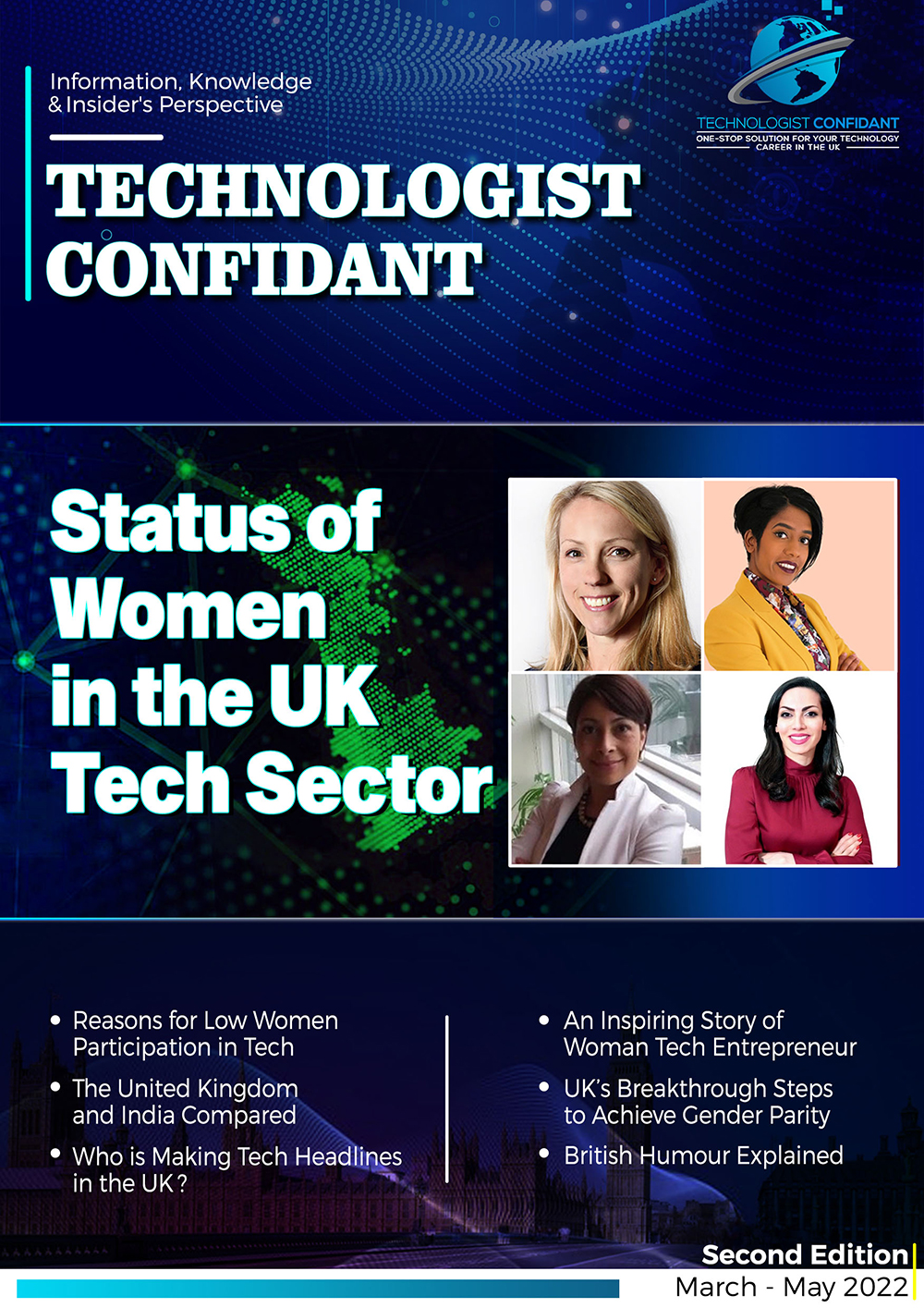Technologist Confidant sat down with Raghu Kerakatty, a global business leader, innovator, tech entrepreneur, technology evangelist, thought leader and sustainable living advocate, to provide our readers with an insider's view on women in technology.
Raghu began his career as a Product Manager at NIIT Technologies India in 2000 after graduating from a prestigious Indian university, NIT (Warangal). Later, he attended IIM Bangalore for business studies, ranked first in India for Business & Management Studies, and moved to senior leadership roles inside digital technology companies such as Sonata Software and Cognizant. He migrated to the UK while he was with Sonata 20 years ago. He spent over ten years with Cognizant, heading its UK and European businesses, before cofounding Toutche in 2021. Toutche is a global electric micro-mobility company that addresses today’s challenges of traffic congestion, climate change and sedentary lifestyle, with its head-turning, high quality, Heileo range of Software-driven Electric Bicycles.
Raghu has been leading technology teams in India, the United Kingdom, and Europe over the past two decades. He has firsthand experience with everything from hiring, developing, and promoting tech talents to their exit interviews. He brings his unique perspective about women in technology which is highly intriguing.
TC: What is the first thing coming to your mind when you think about "women in tech"?
Raghu: The UK tech sector promises phenomenal growth in the future to women in STEM education or women entering this space. However, the under-representation of women in technology is something that we need to be very sensitive about as it is a much-required and talked aspect of progression, which is having more women in Tech.
TC: What do you think of Global gender disparity in the tech sector?
Raghu: It is quite noticeable. However, specific geographical and cultural trends are in play that dispenses gender disparity at various levels. For example, geographically, India has a better representation of women in tech in terms of entry-level jobs compared to other countries. But globally, this number gets depleted at managerial level positions, very thin as we get to senior leadership positions and executive levels. Similarly, some cultural factors at play in different geographies affect women’s career growth – marriage, expectation to prioritise family motherhood, and all compel women to make sacrifices.
TC: Why do you think there are still so few females in the technology sector?
Raghu: Looking at the statistics, I can say that, historically, the percentage of women in STEM education has been lower globally. However, now it is growing slowly and picking pace with time. Currently, it is at 25%. That’s one of the reasons why there are so few females in the technology sector. “When you have a lesser number of women in STEM education, you will find a lesser number of women in technology”.
Since the early days, less percentage of women in STEM has already created gender disparity in the Technology sector. If we go back to the 80s, 90s and probably 20s, it’s been heavily crowded by men. Therefore, in general, we have lots of men already at different levels in a company. Additionally, more men come from STEM education, so the hiring process becomes slightly skewed when offering women senior roles. Unfortunately, there’s little being done to improve the hiring process.
TC: In your opinion, how different/similar is it for women to work in the tech sector in developing countries like India and developed countries like the UK?
Raghu: In my opinion, education and opportunities wise, there’s hardly any difference between India and the UK. The only difference these two nations have is in the cultural aspects, and some of them are also applicable globally, like motherhood. The number of women after having children has seen much slower growth.
TC: According to you, how the UK tech landscape has changed and adapted for women in the wake of the COVID outbreak and Brexit?
Raghu: I believe diversity and inclusion is now a boardroom topic in UK organisations. Gender is a crucial part of that, and there is a pragmatic and affirmative action to drive better representation of women in the Technology sector at all levels. Moreover, company policies are being re-drafted, keeping women in mind. COVID-19 has made remote working a normal phenomenon. The digital workplace is an accepted reality in the world as we advance, helping women and men manage work and personal lives better. Overall, the UK tech landscape is changing and making it friendlier for women and families in general.
TC: Do you think there is an advantage to joining UK's tech sector as a woman? If so, how?
Raghu: The UK tech sector is now very consciously looking to address gender disparity; there is an active movement to increase women’s representation in various companies. New roles are emerging, and robust matrixes are in place to drive the number of women higher. So, there is no better time for women to be a part of the UK’s tech sector. Additionally, the UK technology domain will continue to see phenomenal growth in the future, adding a plethora of best career opportunities to everyone, to women and men. This means that there will be more opportunities for women to enter this space.
TC: What advice would you give to young women entering the tech field in the UK? Anything you wish you had known?
Raghu: The Uk tech sector is a global space that offers great opportunities to women, in particular, to break barriers and explore. Nowadays, it’s not just about having a good job, it is also about accessing immense opportunities to learn, grow and travel. What Covid has done is to allow today’s women or anybody to work from anywhere in the world. The UK has better policies, a friendlier work atmosphere, and the most sensitised workforce, making women feel safe at work and value. It’s a place where women will not be seen as different anymore; instead, it is a place that will become an excellent place for women to work.
TC: What's your suggestion for technologists in a career break or struggling to reenter /grow in the UK sector?
Raghu: The UK Tech sector is progressing day by day; there is no taboo attached for career breaks now. People don’t need to be defensive about a break in your resume. Covid has made temporary career breaks have become more popular among professionals thanks to greater awareness about mental health, self-development, child care, and other topics. Re-entering is also not a problem; nobody should feel bad about it. Employers' attitudes are shifting as they recognise that they may need to release them for some time to retain good employees. An employee who returns with new abilities, such as a new language or a professional certificate, may help the company. Furthermore, the employee is likely to have a revived and revitalised outlook on work.
In an industry that can improve many people's lives, diversity is critical for the end-user, which Technologist Confidant has recognised and promoted. Experts like Raghu suggests that transformation is underway, and a more significant number of women will be a part of the technological future. They just need to be self-assured, select a field that interests them, and pursue it!
More about Raghu Kerakatty:
Raghu is a keen follower and student of technology, with the privilege of witnessing how it transformed itself from a support backbone to one that now transforms businesses, lives, and societies. His work in the technology sector is impressive and varied; from being an advocator of sustainable living to being purposefully driven to leverage technology to help transform the Mobility sector that accounts for 25% of the global CO2 emissions, with Software-led, Smaller, Electric Vehicles.
Connect with Raghu Kerakatty at LinkedIn






